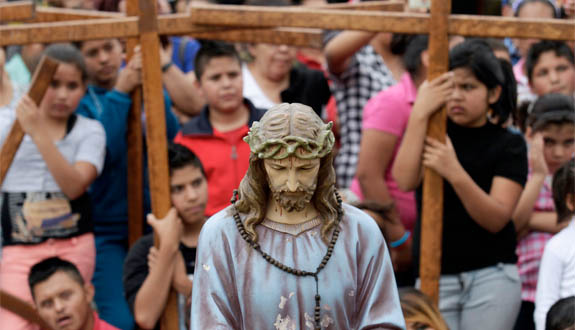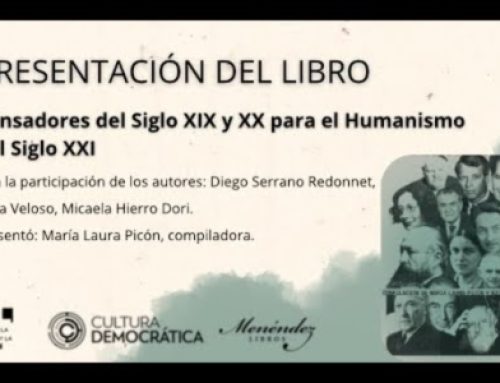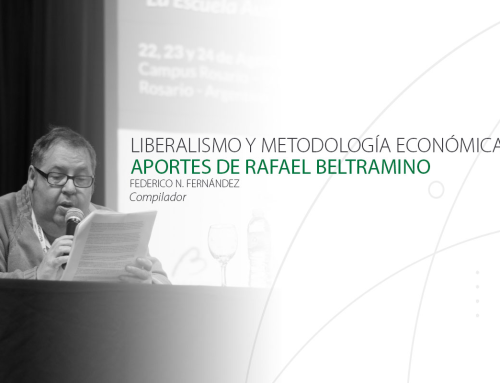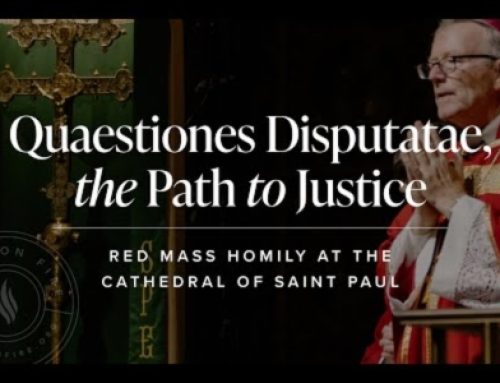Por Samuel Gregg
Diciembre 2014
Fuente: Catholic World Report
Those interested in reviving Catholicism’s saliency in everyday life in Latin America should consider how they can make Christ front-and-center of their social outreach
It’s hardly surprising that the election of Latin America’s Pope Francis has focused more attention on Latin American Catholicism since the debates about liberation theology which shook global Christianity in the 1970s and 1980s. The sad irony, however, is that this renewed attention is highlighting something long known to many Catholics but which non-Catholics are now becoming more cognizant: that Latin America’s identity as a “Catholic continent” is fading and has been doing so for some time.
By that I don’t mean that most Latin Americans no longer identify as Catholic. That’s still the case. Indeed, in many countries south of the Rio Grande, it remains overwhelming true. But what’s clear is that Catholicism’s ability to shape Latin America’s religious context is in decline, or, from another perspective, faces some significant competitors: and not just from Evangelicals but also agnosticism and atheism.
Two recent surveys of religion in Latin America have underscored this point. The more noticed survey, conducted by Pew, illustrated that the percentage of people identifying as Catholic in almost every Latin American country has fallen significantly. And even among those who identify as Catholic, significant numbers describe themselves as being at odds with Church teaching on some key faith and morals questions. Indeed, 60 percent of converts to Evangelicalism say that one reason they left the Catholic Church was that they were looking for more assertive teaching on moral questions. This matters in societies in which, as the Pew survey indicates, most people say they adhere to what would be conventionally called conservative positions on all the usual hot-button issues.
It is true, the survey notes, that regular Mass-goers in Latin America cleave much more closely to Church teaching than those Catholics who don’t. That pattern is more-or-less universal in global Catholicism. It’s also the case that the practicing rate of Latin American Catholics puts your average Western European country to shame. That said, the survey also states that Evangelicals are generally more committed to a life of prayer, regular worship, and other church-based activities than even church-going Catholics.
One reason we can have some confidence that the Pew survey presents a relatively accurate picture of Catholic Latin America is that the results track very closely with another less-noticed survey of religion in America, released in April this year by the Latinobarómetro Corporation, one of the continent’s most respected survey organizations.
To give one example, the Latinobarómetro survey suggests that fewer than half of Hondurans today (47 percent) are Catholic. That’s down from 76 percent in 1995. By comparison, the Pew survey claims that 46 percent of Hondurans are Catholic. Two separate surveys thus confirm that the Catholic Church in Honduras, from a numbers-standpoint, is in deep trouble. No amount of happy-talk can diminish that fact that it’s hemorrhaging adherents.
Both surveys provide a fascinating amount of data about religion in Latin America which will provide sociologists with much to digest for some time. But neither survey purports to provide broad explanations either about what’s been going on in Latin American Catholicism over the past twenty years, or suggestions about the way forward. Nevertheless, they do point to some significant factors worth further contemplation.
The first is that Catholicism in Latin America is being subject to competition, and has been so for at least 30 years. To my mind, that’s a good thing. After all, a market of ideas creates a context in which people are encouraged to consider what they really believe precisely because possible alternatives are more available.
The difficulty for any institution that’s exercised a monopoly position (such as Catholicism in Latin America) in such conditions is that it usually finds adaptation to competition to be very difficult. Initially such institutions often respond by trying to block or disparage competition (which usually fails), instead of asking themselves how they can do what they do more effectively.
With regard to Latin American Catholicism, the jury is still out on whether the on-going disintegration of its once near-monopoly will result in a more energized and committed church. As the sociologist Rodney Stark illustrated in his book The Victory of Reason (2006) many of the Catholic movements that focus on solid formation and foster greater commitment—Opus Dei, Communion and Liberation, Catholic Charismatics, etc.—are flourishing in many Latin American nations. They are the ones who open new churches, have vocations, build universities, and actively evangelize people. They understand the error in simply assuming “the culture” will naturally incline people to Catholic faith.
A second fact worth further contemplation is that Evangelicals (a phrase which covers many theological positions) are, well, more evangelical than Catholics. That’s often the case of religious minorities, especially converts, and most Latin American Evangelicals are converts from (usually a very nominal) Catholicism. But Latin America’s Evangelicals, the survey indicates, are far more willing to speak about Christ than Catholics. The latter by contrast tend to prioritize various forms of social outreach to those in need.
There’s much truth in the well-known saying that “the Church in Latin America opted for the poor, and the poor opted for the Pentecostals.” It’s revealing, however, that even though Evangelicals put more stress on bringing people to Christ than social outreach, the Pew survey also found that, proportionately-speaking, Evangelicals do more social outreach and direct work with the poor than Catholics. They are especially good, for instance, at finding people jobs and helping others to escape alcoholism.
This fits with observations made by Stark where he cites evidence that highly-committed Catholics and Evangelicals in Latin America are far more involved in civil society and the messy work of actually helping real flesh-and-blood people in holistic ways than their co-religionists. In a word, commitment to Christ—whether in the Catholic Church or Evangelical communities—seems to produce socially beneficial and concrete side-effects, including poverty-alleviation.
It follows that Catholic leaders in Latin America interested in reviving Catholicism’s saliency in everyday life may need to consider how they can make Christ front-and-center of their social outreach. By that, I don’t mean “Christ-the-social-worker” or “Christ-the-community-organizer.” If the experiments with liberation theology’s highly-political versions tell us anything, it’s that reducing Christ to a political message undermines people’s faith. As one very wise priest who teaches Catholic social doctrine in Rome writes: “my students who are laypeople and clergy in Latin America give testimony to their experience in their parishes: wherever and whenever liberation theology has entered, people have lost their faith.”
The need to reemphasize Christ also suggests that what might be called “low-intensity Catholicism” also isn’t an option for the Latin American Church. A sure sign of low-intensity Catholicism’s prevalence is whenever you notice that Catholics who speak about the Church being “present” or “available” also seem profoundly reticent to speak about Christ Himself, let alone the content of the Faith. The effect, some might say, is to render the Church invisible, like a piece of furniture in the house that’s always there but never used, and which soon gets forgotten or placed in the attic.
It’s not a case of either/or. You need both presence and proclamation. But it also matters what you proclaim. In the 1970s and 1980s, much of Latin American Catholicism’s proclamation had much more to do with prudential political and economic questions rather than Christ.
In many cases, this may have resulted in those seeking Christ finding Him elsewhere. The Pew survey reports that people’s number-one stated reason (81 percent) for becoming Evangelical in Latin America is that they wanted a personal relationship with God. Put another way, people can find social activism anywhere. But what makes Christianity distinct is Christ. Playing down that distinction is the sure path for Catholicism to collapse, as Pope Francis has said on numerous occasions, turning the Church into just another NGO.
Over-generalizations about Latin American Catholicism should be avoided. The surveys show, for instance, that while Evangelicalism has made big inroads in some Latin American nations, in others (such as Mexico) the impact has been minimal. Likewise, anyone who has been to Latin America knows there are enormous cultural differences between, say, Venezuela and Brazil. There are also major economic variations. Uruguay and Chile are now classified as developed economies. The country physically separating them—Argentina—is a byword for economic disaster.
Yet despite these distinctions, both the Pew and Latinobarómetro surveys indicate that Latin American nations remain intensely religious societies, despite a rise in the “nones.” One (negative) illustration of religion’s continuing influence is that Latin American populist leftism invariably wraps itself in imagery that draws deeply on explicitly Christian symbolism. This is exemplified by the pseudo-religious cults of personality built up around long-deceased populist politicians such as Argentina’s Juan and Evita Peron or Venezuela’s recently-departed Hugo Chavez. Such people may have wrecked their nations’ economies and prospects for long-term political stability, but the saint-like status they are accorded by many of their compatriots is real.
In the end, of course, Catholicism is not a numbers game. Nor is the Church’s business one of gaining “market share” of a given population. Rather the Church is in the business of proclaiming the Truth. For all sorts of reasons, many people won’t accept that message. But unless the message is presented, how can it be declined in the first place? It follows that until many Catholic Latin Americans steel themselves to focus upon proclaiming the fullness of who Christ is, there’s every reason to expect a continued fading of the Catholic Church’s position in a continent where a plurality of the world’s Catholics now live.
And that cannot be good for the universal Church.





Deja tu comentario